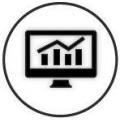This workshop will cover the InDesign basics you need to create research posters, flyers, and layout papers. While focusing on Adobe InDesign, the workshop will cover the different functions of Adobe Illustrator, Photoshop, and InDesign and when and why you would use one program over another.
Sign up for our weekly newsletter!
This is an archive of our past training offerings. We are looking to include workshops on topics not yet covered here. Is there something not currently on the list? Send us a proposal.
Git is a powerful tool for keeping track of changes you make to the files in a project. You can use it to synchronize your work across computers, collaborate with others, and even deploy applications to the cloud. In this workshop, we'll learn the basics of understanding and using Git, including working with the popular "social coding" website, GitHub.
This session is the first of a three part series on regression discontinuity designs. We will cover a number of real-world examples and discuss different ways of analyzing them. We will also go through the necessary components of any regression discontinuity analysis. Sample code will be provided in R.
Check out the remaining workshops in this series:
This workshop will be a dive into programming in Python. We will cover types, functions, lists, loops, dictionaries, and conditionals. By the end, you will have some practice with Python and other resources to further your learning. This workshop expects a little previous exposure to Python -- please see the recommended links in the requirements if you are new to Python.
This is a beginner tutorial for creating vector map illustrations in Adobe Illustrator. We’ll be demonstrating techniques for layering, line techniques, symbols, colors, legends, labels and overall design. The goal will be to learn to draw or recreate any map with your own look and feel.
Outline of process:
The R for Data Science workshop series is a four part course, designed to take novices in the R language for statistical computing and produce programmers who are competent in finding, displaying, analyzing, and publishing data in R.
Day 2 (clean and tidy data)
The goal of this lab is to understand basic concepts and functions of Geographic Information Systems (GIS) and produce geo-coded maps (displaying data) using ArcGIS. We will go over the very basics of spatial data and coordinate systems used in GIS, and then create thematic maps with demographic data representing the Bay Area from the US Census Bureau.
This is the third workshop in a 3-part Stata series offered at the D-Lab that includes: 1) Intro to Stata, 2) Data Analysis in Stata and 3) Stata Programming.
Join the Qualitative Methods Group (QMG) for a conversation with Dr. Caitlin Rosenthal about analyzing archival sources. Dr. Rosenthal will share her experience and advice for working with archival documents.
Multi-stage sampling is required when a complete list of the target sampling units (persons or households) is unavailable or too expensive to assemble. This workshop will discuss how to select units in stages so that the final sample is a probability sample of the defined population.
Come learn how to turn your data into powerful webmaps using R, Shiny and Leaflet. Shiny is a web application framework for R that lets you turn your analyses into online, interactive tools. Leaflet is one of the most popular libraries for creating webmaps. Come learn a little about each of them, and how to use them together to create online, interactive maps straight from your R data.
This is a two-day workshop!
In this workshop, we'll go over the basic high-level charting library available with Bokeh and explain when you might use it (as opposed to matplotlib, D3, ggplot, etc.). We'll give a brief explanation of how web browsers work, and implement some basic interactions on our plots.
This workshop will focus on becoming familiar with searching and downloading the data published by the US Census Bureau via Factfinder and Social Explorer. This will include understanding the data format, Census region mapping, the different surveys used in the US Census, and statistical concept of sampling error in the American Community Survey.
This workshop will cover the basic principles and methods of sampling. Topics will include a discussion of the various types of samples, the creation of sampling frames, the use of stratification, and basic methods of selecting samples. Determining an appropriate sample size will also be discussed.
Qualtrics is a powerful online tool available to Berkeley community members that can be used for a range of data collection activities. Primarily, Qualtrics is designed to make web surveys easy to write, test, and implement, but the software can be used for data entry, training, quality control, evaluation, market research, pre/post-event feedback, and other uses with some creativity. This ov
Although most researchers associate the Census Bureau with the Census of Population and Housing conducted every ten years, the Census Bureau also conducts other demographic surveys - like the Current Population Survey (CPS), the Survey of income and Program Participation (SIPP), and the American Housing Survey, as well economic surveys of firms and establishments, including the Economic Census
This workshop is geared towards social science and digital humanities researchers who have data - scanned images, maps, and spreadsheets, for example, that they want to display on a map. We will discuss and demonstrate how to:
The R for Data Science workshop series is a four part course, designed to take novices in the R language for statistical computing and produce programmers who are competent in finding, displaying, analyzing, and publishing data in R.
Day 1 (basics of R)
Join the Qualitative Methods Group (QMG) for a conversation with Dr. Calvin Morrill on mixed methods research. Dr. Morrill will be sharing his experience with triangulating data across ethnographic, interview, survey, network analysis, and experimental methods.





